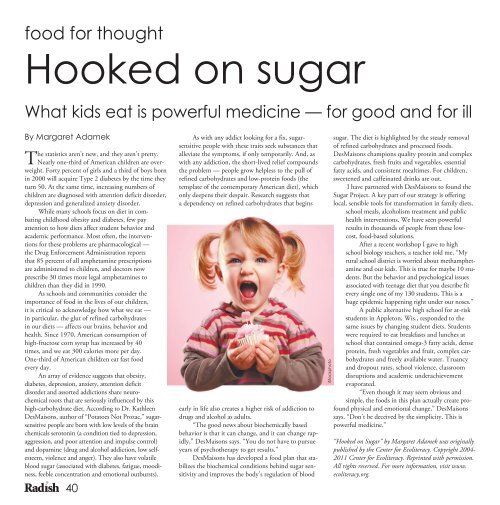for your littlest eaters - Radish Magazine
for your littlest eaters - Radish Magazine
for your littlest eaters - Radish Magazine
You also want an ePaper? Increase the reach of your titles
YUMPU automatically turns print PDFs into web optimized ePapers that Google loves.
food <strong>for</strong> thought<br />
Hooked on sugar<br />
What kids eat is powerful medicine — <strong>for</strong> good and <strong>for</strong> ill<br />
By Margaret Adamek<br />
The statistics aren’t new, and they aren’t pretty.<br />
Nearly one-third of American children are overweight.<br />
Forty percent of girls and a third of boys born<br />
in 2000 will acquire Type 2 diabetes by the time they<br />
turn 50. At the same time, increasing numbers of<br />
children are diagnosed with attention deficit disorder,<br />
depression and generalized anxiety disorder.<br />
While many schools focus on diet in combating<br />
childhood obesity and diabetes, few pay<br />
attention to how diets affect student behavior and<br />
academic per<strong>for</strong>mance. Most often, the interventions<br />
<strong>for</strong> these problems are pharmacological —<br />
the Drug En<strong>for</strong>cement Administration reports<br />
that 85 percent of all amphetamine prescriptions<br />
are administered to children, and doctors now<br />
prescribe 30 times more legal amphetamines to<br />
children than they did in 1990.<br />
As schools and communities consider the<br />
importance of food in the lives of our children,<br />
it is critical to acknowledge how what we eat —<br />
in particular, the glut of refined carbohydrates<br />
in our diets — affects our brains, behavior and<br />
health. Since 1970, American consumption of<br />
high-fructose corn syrup has increased by 40<br />
times, and we eat 300 calories more per day.<br />
One-third of American children eat fast food<br />
every day.<br />
An array of evidence suggests that obesity,<br />
diabetes, depression, anxiety, attention deficit<br />
disorder and assorted addictions share neurochemical<br />
roots that are seriously influenced by this<br />
high-carbohydrate diet. According to Dr. Kathleen<br />
DesMaisons, author of “Potatoes Not Prozac,” sugarsensitive<br />
people are born with low levels of the brain<br />
chemicals serotonin (a condition tied to depression,<br />
aggression, and poor attention and impulse control)<br />
and dopamine (drug and alcohol addiction, low selfesteem,<br />
violence and anger). They also have volatile<br />
blood sugar (associated with diabetes, fatigue, moodiness,<br />
feeble concentration and emotional outbursts).<br />
40<br />
As with any addict looking <strong>for</strong> a fix, sugarsensitive<br />
people with these traits seek substances that<br />
alleviate the symptoms, if only temporarily. And, as<br />
with any addiction, the short-lived relief compounds<br />
the problem — people grow helpless to the pull of<br />
refined carbohydrates and low-protein foods (the<br />
template of the contemporary American diet), which<br />
only deepens their despair. Research suggests that<br />
a dependency on refined carbohydrates that begins<br />
early in life also creates a higher risk of addiction to<br />
drugs and alcohol as adults.<br />
“The good news about biochemically based<br />
behavior is that it can change, and it can change rapidly,”<br />
DesMaisons says. “You do not have to pursue<br />
years of psychotherapy to get results.”<br />
DesMaisons has developed a food plan that stabilizes<br />
the biochemical conditions behind sugar sensitivity<br />
and improves the body’s regulation of blood<br />
iStockphoto<br />
sugar. The diet is highlighted by the steady removal<br />
of refined carbohydrates and processed foods.<br />
DesMaisons champions quality protein and complex<br />
carbohydrates, fresh fruits and vegetables, essential<br />
fatty acids, and consistent mealtimes. For children,<br />
sweetened and caffeinated drinks are out.<br />
I have partnered with DesMaisons to found the<br />
Sugar Project. A key part of our strategy is offering<br />
local, sensible tools <strong>for</strong> trans<strong>for</strong>mation in family diets,<br />
school meals, alcoholism treatment and public<br />
health interventions. We have seen powerful<br />
results in thousands of people from these lowcost,<br />
food-based solutions.<br />
After a recent workshop I gave to high<br />
school biology teachers, a teacher told me, “My<br />
rural school district is worried about methamphetamine<br />
and our kids. This is true <strong>for</strong> maybe 10 students.<br />
But the behavior and psychological issues<br />
associated with teenage diet that you describe fit<br />
every single one of my 130 students. This is a<br />
huge epidemic happening right under our noses.”<br />
A public alternative high school <strong>for</strong> at-risk<br />
students in Appleton, Wis., responded to the<br />
same issues by changing student diets. Students<br />
were required to eat breakfasts and lunches at<br />
school that contained omega-3 fatty acids, dense<br />
protein, fresh vegetables and fruit, complex carbohydrates<br />
and freely available water. Truancy<br />
and dropout rates, school violence, classroom<br />
disruptions and academic underachievement<br />
evaporated.<br />
“Even though it may seem obvious and<br />
simple, the foods in this plan actually create profound<br />
physical and emotional change,” DesMaisons<br />
says. “Don’t be deceived by the simplicity. This is<br />
powerful medicine.”<br />
“Hooked on Sugar” by Margaret Adamek was originally<br />
published by the Center <strong>for</strong> Ecoliteracy. Copyright 2004-<br />
2011 Center <strong>for</strong> Ecoliteracy. Reprinted with permission.<br />
All rights reserved. For more in<strong>for</strong>mation, visit www.<br />
ecoliteracy.org.



